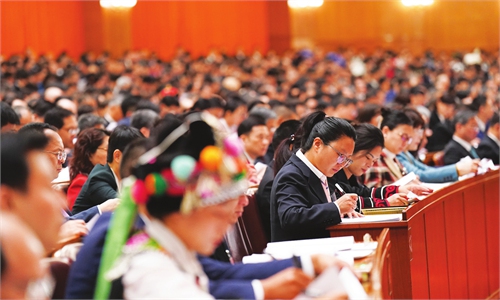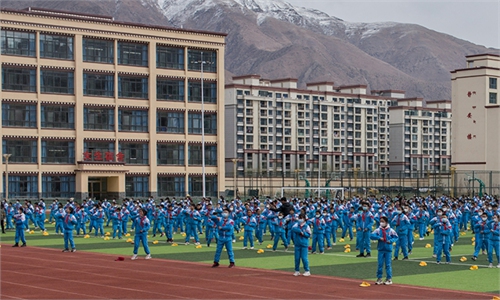China can export education, offer new choice

Illustration: Xia Qing/GT
The British magazine "The Economist" recently published an article about China's education "export," entitled "China wants to export education, too." The word "too" is quite eye-catching.
The article mentions that due to domestic market overcapacity, Chinese companies that run private schools are increasingly investing abroad, particularly in Asia. Many Chinese schools are primarily established for Chinese people working and living locally.
The author notes that the Chinese government views international schools as a service to expatriates and "a source of soft power" to enhance China's global influence.
This article implies that Western countries previously established schools globally, and now Chinese people are doing the same.
Anyone who has visited former Western colonies can probably see some well-established schools founded mainly by Western churches. Now, there are international schools set up by Americans, French and British worldwide, and there are similar schools in China, too.
So now that Chinese people have come, according to Western thinking, this is naturally a form of soft power export associated with the export of ideology that the West is currently very sensitive about.
What is peculiar about this? With China's exceptional primary education system going global, why shouldn't it play a role in international education, particularly for developing nations?
Principal Zhang Guimei and her students are the best explanation for this question.
The 2023 Chinese National College Entrance Examination, known as gaokao, concluded successfully recently. During this nationwide educational event, a touching scene moved the hearts of countless Chinese people: Zhang, the 67-year-old principal of Huaping High School for Girls in Huaping county of Lijiang, Southwest China's Yunnan Province, once again accompanied her students to take the exam.
For years, this elderly principal has been providing free education to girls from impoverished mountain areas, helping them change their destinies through gaokao. This year, 150 students from Huaping High School for Girls, most of them from poor families, participated in the exam.
The story of Zhang and her school vividly illustrates the advantages of the Chinese education system. Its basic characteristics include encouraging children to study hard and strive for improvement, fully demonstrating the traditional Chinese value of emphasizing education.
At the same time, it also embodies the fairness of the Chinese education system: Even if these children come from poor areas and disadvantaged families, they still have the opportunity to change their destinies.
Thousands of stories in China depict young individuals altering their futures as well as the futures of their families through diligent study following the reform and opening-up. These narratives often illustrate China's transition from poverty to the world's second-largest economy, embodying the traditional Chinese spirit.
However, China's education system, especially the gaokao system, is even more critical in this process.
Through reform and opening-up, this system has given Chinese youth ample opportunities to fully utilize the traditional concept of changing one's fate through education.
Although there are some issues that need addressing, China's education system remains the fairest and most compelling selection system under current national conditions.
China's primary and secondary education has long been renowned globally for its solid foundation. More importantly, while encouraging students to study harder, China's education system also helps students from poor areas complete primary education, vocational education and higher education through various means, just like Zhang's high school, which, with national support, sends girls from low-income families to universities every year.
The "export" of Chinese education is not about "competing" with Western international schools, it is about providing children in more countries with a new path to change through education, offering new learning methods and a spirit of diligent study.
Those concerned Westerners cannot let go of their sense of superiority. However, today's world is entirely different from the Western expansion that began five hundred years ago, including the expansion of thought, religion and education.
The seedling has grown into a mighty oak. One day, students will grow up to be teachers, so why can't we learn from each other?
Offering students worldwide a broader array of educational choices will enrich the global landscape, making our world more vibrant and diverse.
The author is a senior editor with the People's Daily, and currently a senior fellow with the Chongyang Institute for Financial Studies at the Renmin University of China. dinggang@globaltimes.com.cn. Follow him on X @dinggangchina




